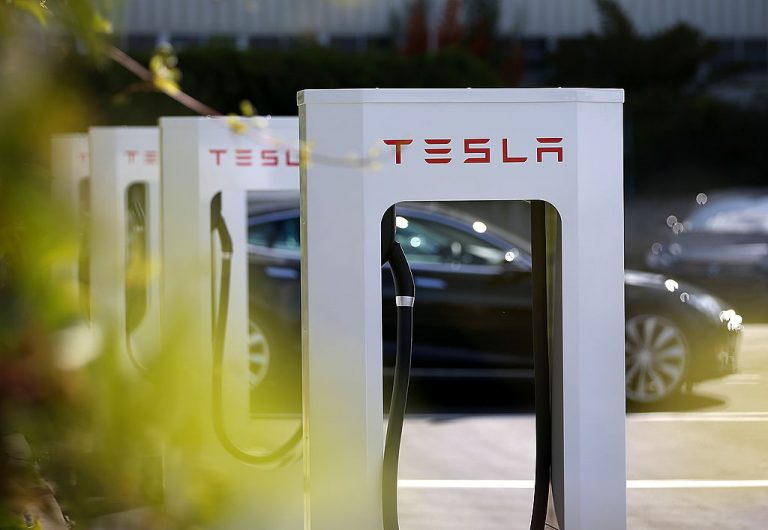Tesla will recall more than 2,800 Model 3 and Model Y vehicles to repair front suspension issues resulting from a manufacturing defect caused by an inappropriately torqued fastener.
The Safety Recall Report to the U.S. National Highway Traffic Safety Administration (NHTSA) states that a total of 2,822 MY 2019 to 2021 Model 3 and MY 2020 to 2021 Model Y vehicles are affected by the recall.
While the afflicted Model Y units were produced between March 7 and June 4 of 2021, the Model 3 units have a much longer production range, spanning from Jan. 3, 2019 to April 20, 2021.
“The front suspension lateral link on Model 3 and Model Y vehicles is attached to the sub-frame using two fasteners. If a fastener is not secured to the correct specification, the fastener may loosen over time or separate from the subframe, which could cause the lateral link to separate from the sub-frame,” explains the Description section of the NHTSA Report.
RELATED ARTICLES:
- As Tesla’s Reliance on Shanghai Gigafactory Grows, Musk Doubles Down on China, Promises More Investment
- Tesla’s China Operations Come Under Fire as Beijing Eyes Electric Car Industry
- Tesla Future in China Uncertain After ‘Brake Failure’ Protest in Shanghai
Success
You are now signed up for our newsletter
Success
Check your email to complete sign up
The risk to drivers if the fastener loosens or separates from the subframe is described as “the wheel alignment could shift and cause instability, which may adversely impact vehicle controllability and increase the risk of a collision.”
Tesla’s explanation for the cause of the problem appears to indicate human error, “During assembly, the operator is tasked with securing both fasteners to the correct specification, which are registered in the torque record for the vehicle.”
“In rare circumstances, if the operator made several unsuccessful attempts to torque a fastener to specification, the operator may have subsequently loosened a properly secured fastener. The torque record may not have accounted for the loosening of the fastener.”
The report states that if the fastener is loose or separated, driver’s should be able to detect the problem by “abnormal noise” being emitted from the front suspension.
The Chronology section of the Report says that in June, 39 service repairs with the same fastener issue were noted and escalated. In response, the company began to examine “production records and the assembly step operations,” but took until October to complete a review of “torque records of other Model 3 and Y vehicles as well as service data” before coming to a recall determination on Oct. 18.
The Recall Schedule for the event says dealers would be notified on Oct. 27, but owners would not be notified until Dec. 24.
The Report says a special tool has been added to Tesla’s production process to prevent a recurrence of the problem, “A multi-spindle tool, which secures the fasteners simultaneously, has been applied to the assembly step. The tool’s loosening feature was disabled by default and programmed to lock itself from further action if there are three unsuccessful attempts to secure a fastener.”
“The operator cannot unlock the tool to loosen or back out a bolt without a production manager’s inspection and approval.”
Made-in-China
The NHTSA Report does not state which VINs were affected. However, any quality control issues can bring to mind Tesla’s outsourcing of increasingly more of its production to its Gigafactory in Shanghai, China.
In Tesla’s Q1 2019 Investor Relations Deck, the company emphasized to investors a wish to produce more Model 3 and Model Y units at a lower cost, touting the virtues of the Shanghai Gigafactory to achieve this goal, “We intend Model 3 to be the first step in a platform which we can cost effectively and quickly replicate across geographies and vehicle types.”
“We have spent years developing this platform, and Gigafactory Shanghai and our planned Model Y production line will be the first to reap the benefits of this investment.”
The Deck continued, “Learning from our experience, we can now build a second-generation Model 3 line in China that we expect will be at least 50% cheaper per unit of capacity than our Model 3-related lines in Fremont and at Gigafactory 1. Our Model Y manufacturing capacity will have the same simplicity as the line planned for Gigafactory Shanghai.”
Tesla did not begin to emphasize production volume by factory in its updates until Q3 2019, but when it started, 350,000 Model 3s were being created in Fremont, California and 150,000 were tagged as “Pre-production” at Shanghai, “We are already producing full vehicles on a trial basis, from body, to paint and to general assembly, at Gigafactory Shanghai,” stated the Q3 Deck.
“We have cleared initial milestones toward our manufacturing license and are working towards finalizing the license and meeting other governmental requirements before we begin ramping production and delivery of vehicles from Shanghai.”
By Q4 2019, Gigafactory Shanghai had moved into Production status and the Fremont Gigafactory had added 50,000 Model Y units to its production cycle.
Through Q3 2020, Tesla said it was creating 250,000 Model 3 units at Shanghai and 500,000 Model 3 and Model Y units at Fremont.
As of Q4 2020, Shanghai was already producing 450,000 Model 3 units. This production level volume and balance between Shanghai and Fremont has stayed relatively flat through Tesla’s most recent Q3 2021 report.
However, quality control issues in American Tesla units appear to lie squarely with the Fremont factory.
While some countries, such as the United Kingdom, have started to receive made-in-Shanghai Model 3 allocation, USA Today published in June that an editor for Cars.com represented to the outlet in comments about its 2021 American Made Index that, “It’s worth noting that Tesla is the only major automaker to claim 100% domestic production for all cars it sells in the U.S., well above the industry’s roughly 52% average for the 2021 model year.”














